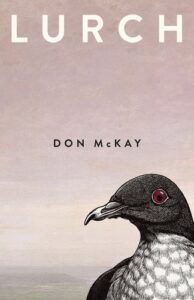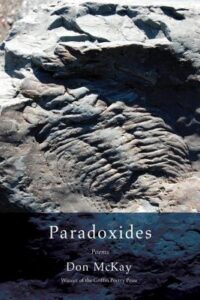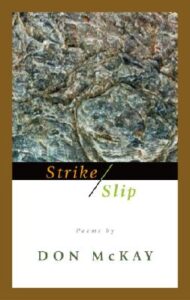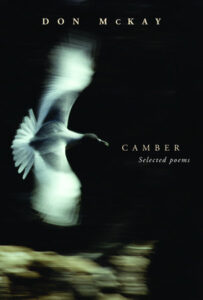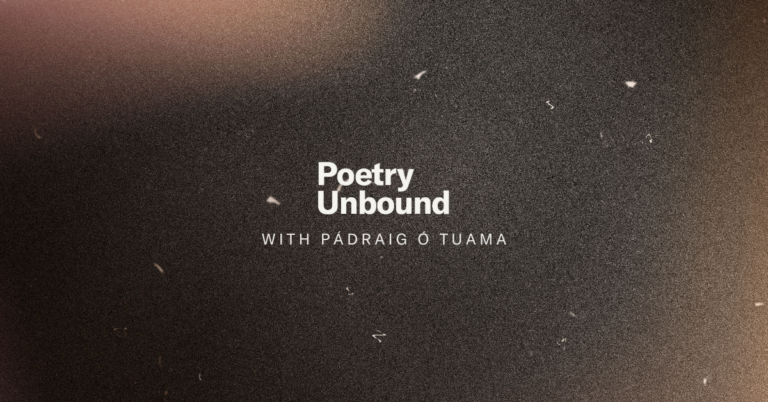Don McKay
Neanderthal Dig
Don McKay’s poem “Neanderthal Dig” begins with the discovery of an ancient, child-sized skeleton placed on the wing of a swan and then takes flight, showing us how love and death are riddled with paradoxes — mixing the earthbound and the sacred, the personal and the universal, the time-stamped and the never ending.
We’re pleased to offer Don McKay’s poem and invite you to subscribe to Pádraig’s weekly Poetry Unbound Substack newsletter, read the Poetry Unbound book, or listen to past episodes of the podcast. We also have two books coming out in early 2025 — Kitchen Hymns (new poems from Pádraig) and 44 Poems on Being with Each Other (new essays by Pádraig). You can pre-order them wherever you buy books.
Guest
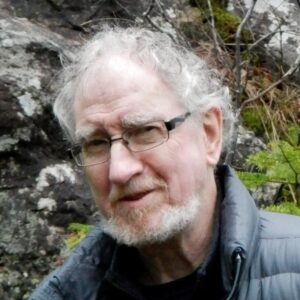
Don McKay is the multi-award-winning author of multiple books of poetry, including Lurch, Paradoxides, Strike/Slip (winner of the Griffin Poetry Prize), and Camber: Selected Poems (finalist for the Griffin Poetry Prize and a Globe and Mail Notable Book of the Year). McKay has taught poetry in universities across Canada. He currently lives in St. John’s, Newfoundland.
Transcript
Transcription by Alletta Cooper
Pádraig Ó Tuama: My name is Pádraig Ó Tuama, and I’m very glad to be from a place that has particular death rituals. And the poem we’re going to look at today makes reference to ancient death rituals. This last summer, I was doing some teaching and there was a guy in the class from the Romansh-speaking part of Eastern Switzerland. He was a Protestant minister — and he told me that in one of the parishes where he works when somebody has died, it isn’t the minister that welcomes the family into the church for the funeral service. It’s the family who had been bereaved before that. I thought it was a beautiful ritual. Death rituals say so much to us about the way we want to live, and primarily death rituals are to help the living keep living. I love that. It’s a note of defiance and tenderness and care and love that we show to each other in the midst of difficult times.
[music: “Praise the Rain” by Gautam Srikishan]
“Neanderthal Dig” by Don McKay
1.
“When we dug up the grave
we found a child’s bones
laid on a great swan’s wing.
They had never been, we thought,
the sharpest flints in the cave,
with thick skulls evolving toward NFL
helmets. We’d applied their name
(from Neander Vale, site
of the first remains we found)
to racists, sexists, and dull
bureaucrats.
“Now we stood abashed,
trespassers on grief, thoroughly sapiens
with artful implements and wit.
What would it be like to be so stricken,
with few words to call on heaven, hell,
hope, grief? And what
sharp words might we, the clever cousins,
muster for the child who one
day watched a Mute Swan (wingspan:
five feet) lift from the river in two white
swipes of Paleolithic air?
2.
“What manner of wreath
might honour this death?
Some wing of language
entering earth?
Wherever you’re gone
may your spirit wander
wild as a swan
in the Vale of Neander.”
[music: “Ashed to Air” by Gautam Srikishan]
Don McKay titles this poem “Neanderthal Dig,” which gives us an indication at the start of some kind of archeological exploration. Neanderthals are our very early cousins, and we are all made up of our early ancestors.
There was a dig discovered — this is in modern-day Denmark — that discovered who it is imagined to be a mother and a child buried alongside each other, each dressed up, it seems — they’re guessing from small fragments that remain — in some kind of ceremonial clothing. And the child was laid on the wing of a swan. Obviously, Don McKay wasn’t at this dig, but he writes as if he was, and I’ve read a couple of different estimations that this particular pair of human beings, it’s estimated that that was sometime around 7,000 to 6,000 years ago, that kind of span of time.
I know I harp on fairly often about the fact that every poem is about time, but I think they are. And deliberately, this one is very much about time. I remember when I was 8 deciding, Okay, I have sense now. And I looked with absolute disdain upon myself up until that age. I thought, Oh, I was only 7 when I said that I had no sense. And then when I was 9, I decided, No, no, no, I’ve got sense now. And I was a fool to think I had sense when I was 8. And that’s just inside one small, complicated boy’s brain. There’s all kinds of ways within which we refer to the past and seem to imply that because it was in the past that they were more ignorant. And I think probably every age feels sophisticated and is, at that stage, the most sophisticated that human technology has been. So of course, in 200 years time, people are going to speak about us and find it funny, perhaps, that we thought that we were technologically advanced. “They had never been, we thought, / the sharpest flints in the cave.” And then he goes on to talk about the helmets and racists and sexists and bureaucrats. Deliberately insulting. And I find it funny because he’s kind of highlighting how limited it is to think that we, today, can apply that to someone else without applying it to ourselves. And that’s exactly what he does do. To speak, not necessarily by calling us all ignorant, but by saying we’re each faced with the limitation of ourselves when we’re faced with what we cannot control. The death of someone else, the death of a child, what to do in the face of terrible grief. A swan’s wing perhaps. Could there be a more beautiful thing to do?
[music: “First Grief, First Air” by Gautam Srikishan]
I love the poetry of the line “some wing of language” because even in the elevated choice of syntax here, he’s also pointing beyond language or pointing, perhaps, to the heart of it: Language is just another word for tongue. And speaking about a “wing of language” is speaking about the physicality of it; that all language is body language. And that way before we had what we think is our own contemporary cleverness, we had bodies. And so body language is much, much older than what we might think of as speech.
Friends of mine, their son died and he was only a day or two old. And when his body was being laid into the grave, the small coffin was too light to be laid down easily. So my friend jumped into the grave himself and took the coffin in his hands and laid it down at the bottom of the grave. It’s what everybody talked about afterward, just the fact that even there he was parenting. It was the body language of this, the tenderness with which he laid it down, the fact that he was the last one, not a rope, not something being lowered down by non-physical means. It was him who laid his son to rest in the great earth. And this, I think, speaks to us about how contemporary these people were, however many thousands of years ago it was, who laid a child to sleep in the earth on the wing of a swan.
[music: “Catching Water” by Gautam Srikishan]
I encountered Don McKay when I interviewed him over the summer. He won the Griffin Poetry Prize Life Achievement Award in 2024. He’s a Canadian poet. He said once that he has had two great conversions in his life. The first conversion is to birds, and the second conversion is to geology. And I feel like this poem highlights both when he’s saying that somebody perhaps “watched a Mute Swan…/…lift from the river in two white / swipes of Paleolithic air” He’s speaking about the sense of wonder that people from contemporary times to ancient, ancient times have had fascination and attention given to watching a bird in flight.
And then the Vale of Neander and the fact that people are digging and going into the earth, this speaks to his second great conversion towards geology, toward the rock upon which we stand, toward the place from which our food grows, toward the ways within which we make home and habitation, but also the ways within which our bones return to the earth and that we, ourselves, become part of what it is that others stand on as years and eons go by.
The way that Don McKay has laid this poem out, it’s in two sections, and actually, they’re numbered. Sometimes people do and sometimes people don’t read the numbers out. The second part starts with the lines, “what manner of wreath / might honour this death?” And it’s, at this point, I think that the poem rises to something like a hymn, something like a lullaby.
I like, sometimes, to look at the last word of each successive line in a poem or just within one part of a poem, perhaps, to see is there some kind of code, some kind of music created by the final word in successive lines. And these last eight lines, they finish with the words “wreath,” “death,” “language,” “earth,” “gone,” “wander,” “swan,” “Neander.” You can hear that there is some kind of elemental rhyming and some kind of elemental music being created in these. And it finishes with a benediction. “Wherever you’ve gone / may your spirit wander / wild as a swan / in the Vale of Neander.” This hope for something that could rise above the earth “wild as a swan,” while also being in the earth, “in the Vale of Neander.”
[music: “Every Place We’ve Been” by Gautam Srikishan]
There’s an interesting way within which we understand where it is that a person’s remains are laid to be sacred ground and that, whatever one’s affiliation with religion or not, that treating the remains of somebody is something of great respect. And even when it comes to Neanderthal, “when we dug up the grave / we found a child’s bones.” And what it is that they discovered changed what it is they thought about grief rituals from whomever it was that had made this burial. And it shows something about what happens when we start to dig. We don’t only dig up the past, we also dig up something of our contemporary understanding about what matters, about how to show respect, about what is sacred. And it changes the way you relate to land, as well, when you realize that somebody would have chosen this particular part of land to have it as a place of burial.
[music: “Every Place We’ve Been” by Gautam Srikishan]
“Neanderthal Dig” by Don McKay
1.
“When we dug up the grave
we found a child’s bones
laid on a great swan’s wing.
They had never been, we thought,
the sharpest flints in the cave,
with thick skulls evolving toward NFL
helmets. We’d applied their name
(from Neander Vale, site
of the first remains we found)
to racists, sexists, and dull
bureaucrats.
“Now we stood abashed,
trespassers on grief, thoroughly sapiens
with artful implements and wit.
What would it be like to be so stricken,
with few words to call on heaven, hell,
hope, grief? And what
sharp words might we, the clever cousins,
muster for the child who one
day watched a Mute Swan (wingspan:
five feet) lift from the river in two white
swipes of Paleolithic air?
2.
“What manner of wreath
might honour this death?
Some wing of language
entering earth?
Wherever you’re gone
may your spirit wander
wild as a swan
in the Vale of Neander.”
[music: “Praise the Rain” by Gautam Srikishan]
Chris Heagle: “Neanderthal Dig” comes from Don McKay’s book Lurch. Thank you to McClelland & Stewart who gave us permission to use Don’s poem. Read it on our website at onbeing.org.
[music: “Praise the Rain” by Gautam Srikishan]
Poetry Unbound is: Gautam Srikishan, Eddie Gonzalez, Lucas Johnson, Kayla Edwards, Tiffany Champion, Cameron Musar, and me, Chris Heagle.
Our music is composed and provided by Gautam Srikishan and Blue Dot Sessions.
This podcast is produced by On Being Studios, which is located on Dakota land. Open your world to poetry with us by subscribing to our Substack newsletter. For links and to find out more visit poetryunbound.org.
Books & Music
Recommended Reading
The On Being Project is an affiliate partner of Bookshop.org and Amazon.com. Any earnings we receive through these affiliate partnerships go into directly supporting The On Being Project.





